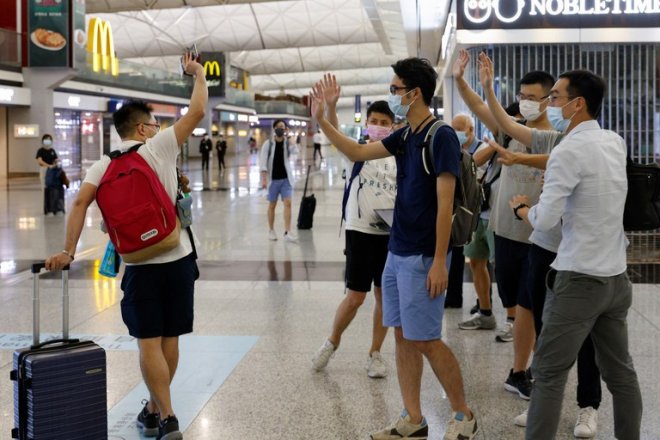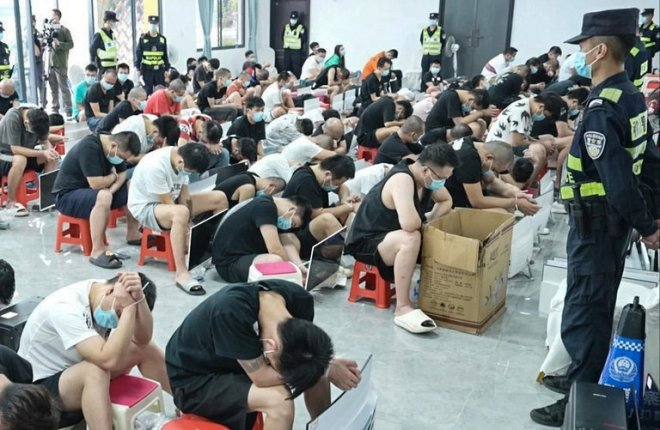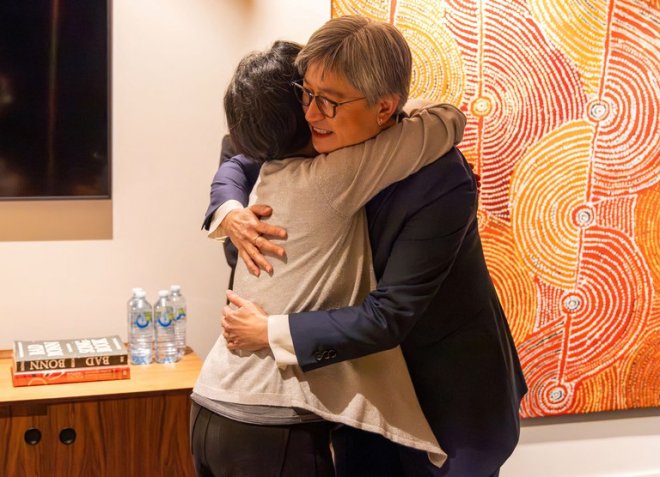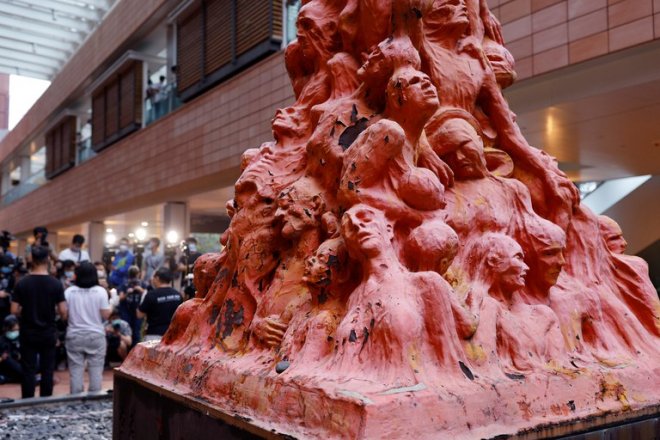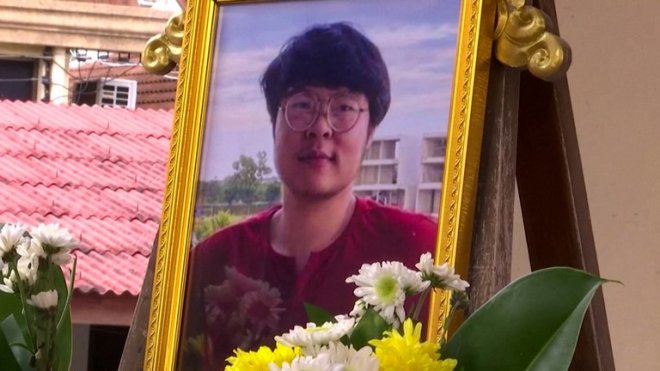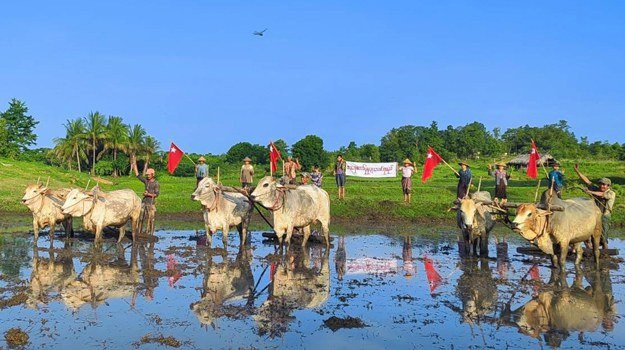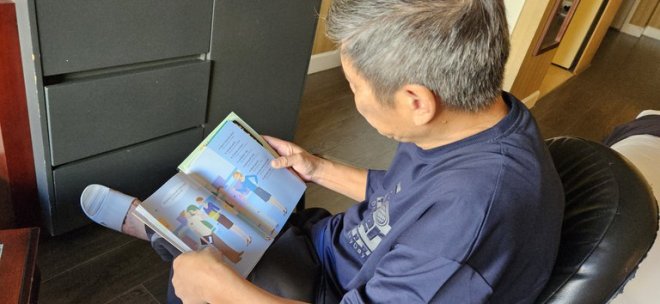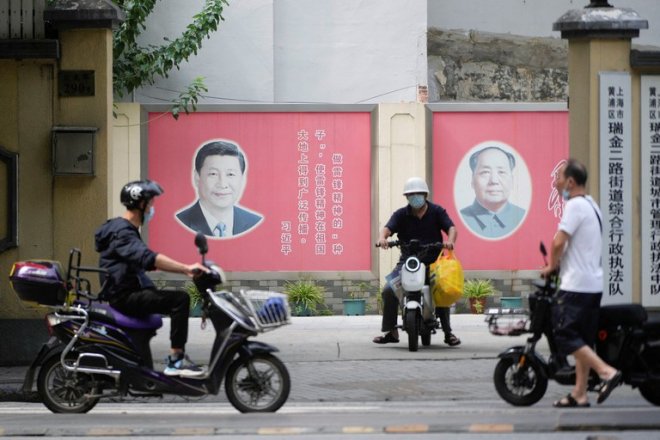Chinese leader Xi Jinping rekindles official fervor for Communist Party 'holy' sites
Chinese leader Xi Jinping kicks off his third term in office with official visits to several of the Communist Party"s "holy places," sparking a slew of copycat visits from lower-ranking officials.
Xi"s tour took in the former communist base of Yan"an, home to Mao Zedong and the communist leadership in the 1930s, as will as the Red Flag Canal, a 44-mile-long irrigation dug by hand through mountainous terrain near the central city of Anyang.
"Yan"an was Xi"s first destination for his inspection tour after the conclusion of the 20th [party congress]," the ideological journal Qiushi said of the visits.
"The Red Flag Canal is a monument inscribing the heroic spirit of the unyielding and valiant local people who dare to fight to change their fate," the journal said.
"China"s socialism is won by hard work, struggles and even through the sacrifice of lives. This was not only true in the past but also true in the new era," it said.
In an indication that Xi"s preference for traditional Chinese culture over Western values is still setting the political agenda, the journal also reported on Xi"s visit to an archaeological site near Anyang, "where he observed ... samples of animal-driven carts and remains of a Shang Dynasty road [as well as] oracle bone inscriptions."
"I came here for a deeper study and understanding of Chinese civilization so that we can … make the past serve the present," Xi said. "Chinese characters [the written language] are extraordinary and serve as a tie in the forming and development of the Chinese nation."
"We should stay confident in our culture and be more confident and prouder to be Chinese," Xi was quoted as saying.
Reviving reverence
Hu Ping, U.S-based former editor-in-chief of Beijing Spring magazine, said Xi"s tour appears to be a way of reviving reverence for Communist Party history, through the performance of unnecessarily hard labor or other sacrifices, that is later used as a model in government propaganda.
He said it was unnecessary to focus on sheer brute force and heroic physical effort, or "model" villages like Dazhai, rather than through the development of new technology.
"It"s ridiculous to ask people to learn from Dazhai again," Hu said. "China shouldn"t be learning its agricultural water conservation practices from Mao."
"It should use science, technology, and mechanized production instead of physical strength," he said. "It"s absurd."
Hu said Xi"s pilgrimages are a bid to boost the cult of personality around himself as "core" party leader.
Taiwan-based Chinese dissident Gong Yujian said successful Chinese leaders -- even in imperial times -- are typically seen as able to contend with vast forces of nature, find solutions and protect people from the elements.
"There are so many spirits in the Chinese Communist Party lexicon," Gong told RFA. "In terms of place-names, there"s the spirit of [the] Daqing [oilfield], and the Dazhai spirit. When it comes to people, there"s also the spirit of [former soldier and model worker] Lei Feng."
"There are far too many of these figures, which are impossible to emulate," he said.
‘Decoupling from the rest of the world’
Gong said Xi"s visit to the Red Flag Canal came at a time when many Chinese officials are under sanction by the U.S. government over the country"s human rights record, with import bans imposed on high-tech components that might have a military use.
"Xi Jinping is preparing the ground for decoupling from the rest of the world," Gong said. "Back when we were isolated from the world during the Mao era, there was also a lot of talk about this or that "spirit"."
He added: "The Chinese government should try to develop China"s high-tech and automation sector, instead of going back to the cumbersome and utterly exhausting practices of the Mao era."
Xi"s "pilgrimage" to the iconic sites of Chinese communism has set off a wave of copycat visits from regional leaders, with Anhui provincial party chief Zheng Shajie and Shanghai party secretary Chen Jining turning up at the Red Canal museum near Anyang along with their entire leadership teams last week, the Anhui Daily newspaper reported.
In the southern city of Guangzhou, municipal party chief Huang Kunming turned out with his leadership team in a pilgrimage to the city"s Mao-era monuments to revolutionary heroes, the Nanfang Daily newspaper reported.
Hunan-based journalist Gao Cun said the rush is now on to demonstrate loyalty to Xi, who begins a third and indefinite term as general secretary of the party and "core" leader.
"The fact that senior party officials are doing this shows that there is no room for any change of direction from within the party," Gao told RFA. "Chinese society is regressing."
Translated and edited by Luisetta Mudie.
[圖擷取自網路,如有疑問請私訊]
Xi"s tour took in the former communist base of Yan"an, home to Mao Zedong and the communist leadership in the 1930s, as will as the Red Flag Canal, a 44-mile-long irrigation dug by hand through mountainous terrain near the central city of Anyang.
"Yan"an was Xi"s first destination for his inspection tour after the conclusion of the 20th [party congress]," the ideological journal Qiushi said of the visits.
"The Red Flag Canal is a monument inscribing the heroic spirit of the unyielding and valiant local people who dare to fight to change their fate," the journal said.
"China"s socialism is won by hard work, struggles and even through the sacrifice of lives. This was not only true in the past but also true in the new era," it said.
In an indication that Xi"s preference for traditional Chinese culture over Western values is still setting the political agenda, the journal also reported on Xi"s visit to an archaeological site near Anyang, "where he observed ... samples of animal-driven carts and remains of a Shang Dynasty road [as well as] oracle bone inscriptions."
"I came here for a deeper study and understanding of Chinese civilization so that we can … make the past serve the present," Xi said. "Chinese characters [the written language] are extraordinary and serve as a tie in the forming and development of the Chinese nation."
"We should stay confident in our culture and be more confident and prouder to be Chinese," Xi was quoted as saying.
Reviving reverence
Hu Ping, U.S-based former editor-in-chief of Beijing Spring magazine, said Xi"s tour appears to be a way of reviving reverence for Communist Party history, through the performance of unnecessarily hard labor or other sacrifices, that is later used as a model in government propaganda.
He said it was unnecessary to focus on sheer brute force and heroic physical effort, or "model" villages like Dazhai, rather than through the development of new technology.
"It"s ridiculous to ask people to learn from Dazhai again," Hu said. "China shouldn"t be learning its agricultural water conservation practices from Mao."
"It should use science, technology, and mechanized production instead of physical strength," he said. "It"s absurd."
Hu said Xi"s pilgrimages are a bid to boost the cult of personality around himself as "core" party leader.
Taiwan-based Chinese dissident Gong Yujian said successful Chinese leaders -- even in imperial times -- are typically seen as able to contend with vast forces of nature, find solutions and protect people from the elements.
"There are so many spirits in the Chinese Communist Party lexicon," Gong told RFA. "In terms of place-names, there"s the spirit of [the] Daqing [oilfield], and the Dazhai spirit. When it comes to people, there"s also the spirit of [former soldier and model worker] Lei Feng."
"There are far too many of these figures, which are impossible to emulate," he said.
‘Decoupling from the rest of the world’
Gong said Xi"s visit to the Red Flag Canal came at a time when many Chinese officials are under sanction by the U.S. government over the country"s human rights record, with import bans imposed on high-tech components that might have a military use.
"Xi Jinping is preparing the ground for decoupling from the rest of the world," Gong said. "Back when we were isolated from the world during the Mao era, there was also a lot of talk about this or that "spirit"."
He added: "The Chinese government should try to develop China"s high-tech and automation sector, instead of going back to the cumbersome and utterly exhausting practices of the Mao era."
Xi"s "pilgrimage" to the iconic sites of Chinese communism has set off a wave of copycat visits from regional leaders, with Anhui provincial party chief Zheng Shajie and Shanghai party secretary Chen Jining turning up at the Red Canal museum near Anyang along with their entire leadership teams last week, the Anhui Daily newspaper reported.
In the southern city of Guangzhou, municipal party chief Huang Kunming turned out with his leadership team in a pilgrimage to the city"s Mao-era monuments to revolutionary heroes, the Nanfang Daily newspaper reported.
Hunan-based journalist Gao Cun said the rush is now on to demonstrate loyalty to Xi, who begins a third and indefinite term as general secretary of the party and "core" leader.
"The fact that senior party officials are doing this shows that there is no room for any change of direction from within the party," Gao told RFA. "Chinese society is regressing."
Translated and edited by Luisetta Mudie.
[圖擷取自網路,如有疑問請私訊]
|
本篇 |
不想錯過? 請追蹤FB專頁! |
| 喜歡這篇嗎?快分享吧! |
相關文章
AsianNewsCast









